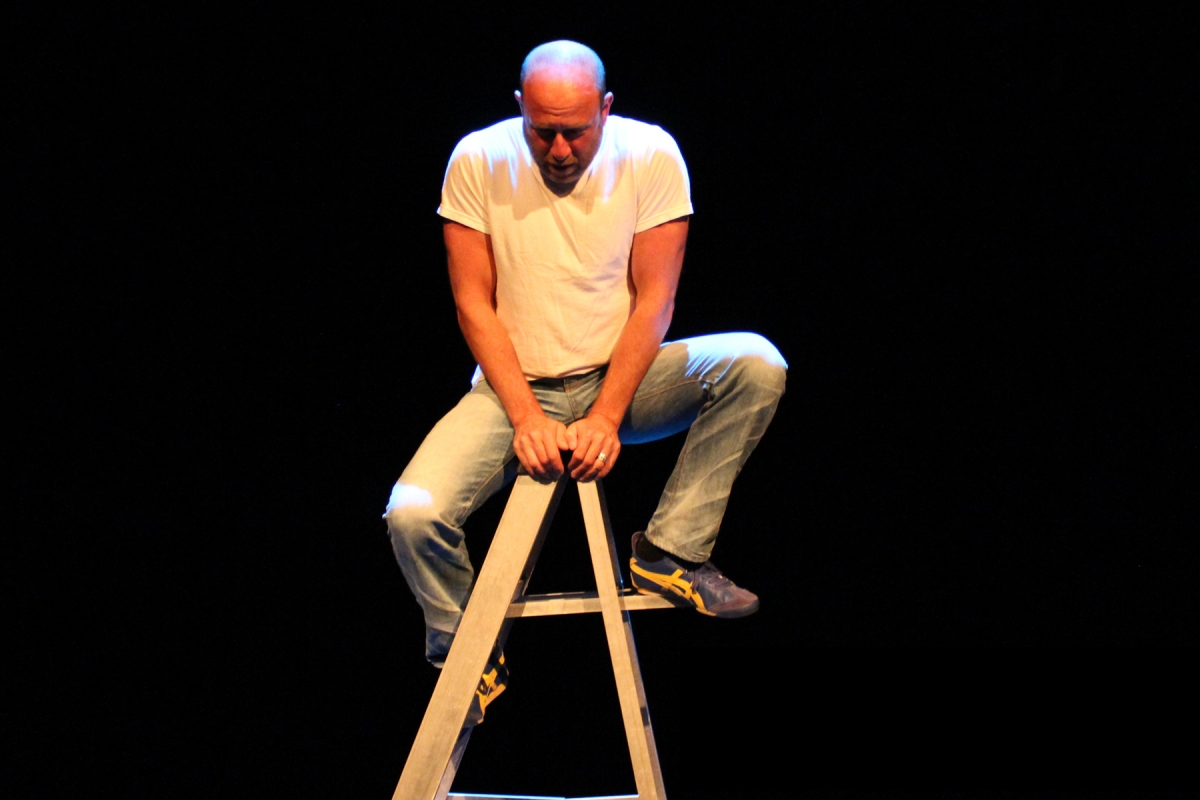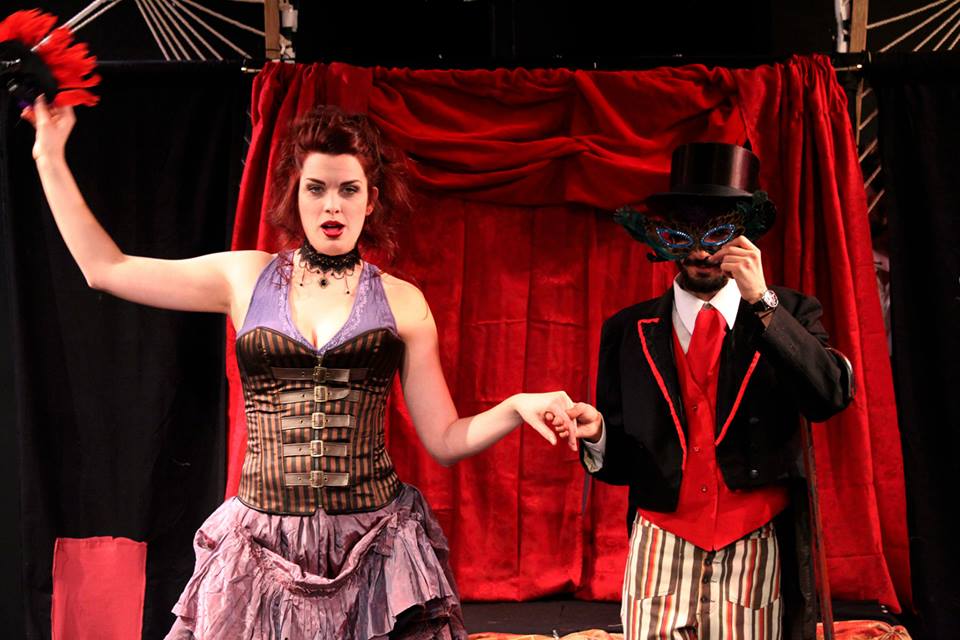
This is the second of two dispatches from the theater festival whose name continues to reflect conditions in our fair city: Frigid New York. Frigid is in its ninth year, and all of its revenue goes directly to the artists involved. This year, there are 30 shows running for a combined total of 150 performances in two theaters. We have previously discussed Frigid's Dog Show, The Can Opener, and the excellent Richard the Third and Goal; here, we talk about Bi, Hung, Fit...and Married, which maps an "erotic journey" to escape heteronormativity; Erik, a comic reimagining of The Phantom of the Opera; and 300 to 1, a fantastic one-man show that brings Sparta and Flanders to Manchester.
Framing the narrative of The Phantom of the Opera as a carnival sideshow, Erik takes on society's obsession with beauty and perfection and its correlative fascination with oddities. The first exhibit on show is thus "the Perfect Baby" (puppeteered by Kervin Peralta, who also plays puppet Erik), a towheaded infant in a cage, whose angelic singing voice turns out to be counterbalanced by facial deformity. After this, the carnival barker and his wife introduce segments that retell the familiar story of Erik, the Phantom of the Opera, and his love for opera singer Christine, including where that caged baby fits into things. The Barker (Yair Ben-Dor) has great energy and functions like a combination of showman and Greek chorus. Destiny Shegstad, as the Barker's wife, Madam Giry, plays well off her contentious partner, and makes an impression whenever she is onstage. Montana Lampert Hoover ably creates a Christine whose sweetness turns out to be just one part of a darker whole, and the increasing revelation of those less-innocent aspects heightens the comedy. The rest of the cast, especially Bryn Packard as Christine's smug, doltish (though occasionally sympathetic) would-be husband, Raoul, keep the laughs coming at a brisk pace. Some of the specific jokes work best having seen the silent film Phantom, and others the musical, but eventually Erik departs more and more from its source. It does so, for example, to make the point that "heroes" are created from the blood and misery of others, and the play eventually almost completely erases the lines between heroes and villains, as well as between who is a "puppet" and who is not -- most notably, in both cases, including Erik and Christine. The ending conveys the sense that this will all start over and repeat itself, both within the world of the play and its narrative and with the next audience to come to gawk at the imperfect. Overall, though, these themes are, for the most part, all presented with a light touch, more jokes than theses.
Bi, Hung, Fit... and Married (image top), which premiered at the Vancouver International Fringe Festival in 2012, chronicles its writer and performer Mark Bentley Cohen's long path to embracing his bisexuality and creating a new, consensually non-monogamous relationship with his wife. Bisexuality, especially male bisexuality, continues often to be ignored or marginalized, even in conversations among members the LGBTQ community and its allies. Cohen and his freemate, to borrow their neologism, producer Lianna Walden, run workshops on sexuality and are launching a nonprofit called The Centre for Sex and Sexuality, and this one-man play, based on Cohen's autobiographically-informed book, Confessions of a Bisexual Husband, offers another much-needed contribution to our current conversations about sexual desire, identity, and freedom. Bi, Hung, Fit...and Married begins with its narrator, Marco, having been married to Gabrielle for 12 years, and it wastes no time delving into the loss of privacy and the increase in comfortable inertia and figurative confinement that often accompany traditional marriage. Early comments about these two professionally creative people dropping the "artsy" stuff after marriage provides a parallel to the way that married individuals are expected to drop their desires, especially if those desires happen to be non-normative. It is no coincidence that Marco's 15-year experimentation with his friend Stuart ended only with Stuart’s engagement. The show cleverly marks each major step forward with a rhetorical refrain about what "intimacy" means, and Marco takes the audience through his initial, anxious, internet-facilitated hookups with other men, his coming out to his wife and children, the eventual evolution of his and Gabrielle's relationship to encompass threesomes, and, finally, its move into a post-monogamy freedom for both partners to explore alone or together. As explorers is in fact how Marco and Gabrielle see themselves, how they must see themselves: fulfillment requires vulnerability and risk, and that means having a touch of the adventurer. A show like this depends on as great storyteller for success, and Mark Bentley Cohen is a great storyteller. Clad in a simple white t-shirt and jeans, he holds the mostly empty stage, and the audience’s attention, with assurance. Bi, Hung, Fit... and Married is not afraid to talk about sexual desire and experience in honest, blunt terms, and it similarly doesn't shy away from the difficulties and risks that come with this kind of exploration; but, ultimately, Cohen's play is about the fluidity of sexual desire and about non-monogamy empowering and freeing men and women to embrace that fluidity.
 As with Erik, 300 to 1 probably works best having seen Zack Snyder's film adaptation of Frank Miller's 300. But a lack of familiarity with Snyder's film, which is heavy on CGI and light on shirts, shouldn’t dissuade anyone from seeing this show. It's easy to see why 300 to 1 has been collecting awards, including from the Edinburgh Fringe Festival. Matt Panesh puts on a bravura one-man performance as a 15-year old boy, two dead World War I poets, and most of the important characters in 300, leaping among characters and accents with manic, infectious energy; the audience fills in for the extras -- and the soundtrack -- when called upon. The aforementioned teenager, assigned to read Wilfred Owen and Siegfried Sassoon, prefers the boy's fantasy version of war, with six-pack abs and sexy queens, that he has seen in films like Snyder's. Accordingly, he misreads Owen's famous use of dulce et decorum est/pro patria mori as an endorsement. A later moment when the boy briefly confuses 300 with Braveheart highlights the consistency of the discourse that glamorizes death in battle. After the ghosts of Owen and Sassoon pay him a visit, the boy ends up reenacting much of the film for them in an attempt to show them how cool war can be. The back and forth among the three allows the play to juxtapose art in response to war to art that aestheticizes war, with one of the poets, for instance, asking if the stylized slow motion conflict of the film is some sort of modern dance. Panesh also plays on the much-discussed homoeroticism of the film to look at where hyper-masculinity shades into homeotoricism, again juxtaposing it to the lived experience of Owen and Sassoon as homosexuals in the military and how Sasson's wealth afforded him the freedom to live uncloseted. While the critiques are trenchant, Panesh makes them through a humor that has shades of Monty Python to it (it doesn’t hurt that, with his Leonidas beard, he recalls Graham Chapman a bit).
As with Erik, 300 to 1 probably works best having seen Zack Snyder's film adaptation of Frank Miller's 300. But a lack of familiarity with Snyder's film, which is heavy on CGI and light on shirts, shouldn’t dissuade anyone from seeing this show. It's easy to see why 300 to 1 has been collecting awards, including from the Edinburgh Fringe Festival. Matt Panesh puts on a bravura one-man performance as a 15-year old boy, two dead World War I poets, and most of the important characters in 300, leaping among characters and accents with manic, infectious energy; the audience fills in for the extras -- and the soundtrack -- when called upon. The aforementioned teenager, assigned to read Wilfred Owen and Siegfried Sassoon, prefers the boy's fantasy version of war, with six-pack abs and sexy queens, that he has seen in films like Snyder's. Accordingly, he misreads Owen's famous use of dulce et decorum est/pro patria mori as an endorsement. A later moment when the boy briefly confuses 300 with Braveheart highlights the consistency of the discourse that glamorizes death in battle. After the ghosts of Owen and Sassoon pay him a visit, the boy ends up reenacting much of the film for them in an attempt to show them how cool war can be. The back and forth among the three allows the play to juxtapose art in response to war to art that aestheticizes war, with one of the poets, for instance, asking if the stylized slow motion conflict of the film is some sort of modern dance. Panesh also plays on the much-discussed homoeroticism of the film to look at where hyper-masculinity shades into homeotoricism, again juxtaposing it to the lived experience of Owen and Sassoon as homosexuals in the military and how Sasson's wealth afforded him the freedom to live uncloseted. While the critiques are trenchant, Panesh makes them through a humor that has shades of Monty Python to it (it doesn’t hurt that, with his Leonidas beard, he recalls Graham Chapman a bit).
300 to 1, another must-see at Frigid, breaks from comedy only in its final moments, when it also breaks the fourth wall to address the mental health and homelessness issues of real veterans, a reminder to the audience that while Gerard Butler is probably doing fine, the modern-day counterparts of Owen and Sassoon could use better support. - Leah Richards and John Ziegler
